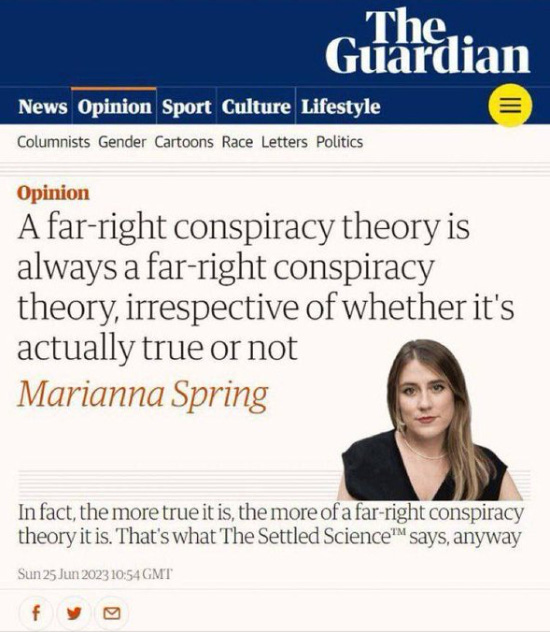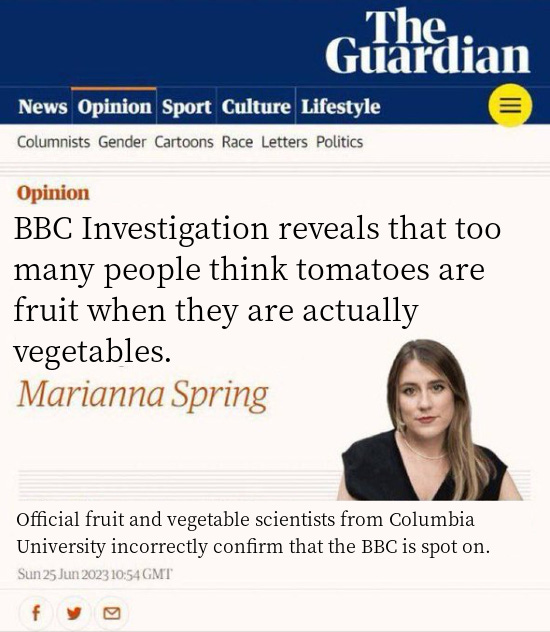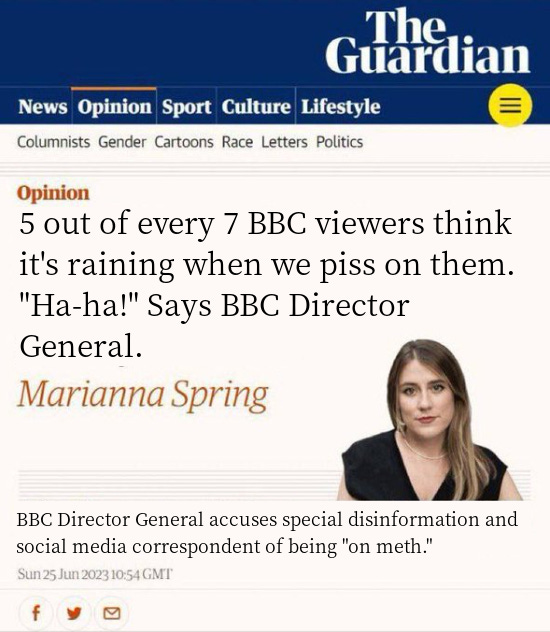Subscribe to Zero-Sum Pfear & Loathing



by Iain Davis | Jul 6, 2023
On 30th June Reuters fact checked a joke. Either they don’t have a sense of humour—highly likely—or believe that no one else has a sense of humour and needs every joke explained to them—even more likely—or Reuters fact checkers have disappeared so far up their own backsides that it is actually them who can’t discern reality—a nailed on certainty.
The joke in question was a mock-up of a looky-likey Guardian headline, seemingly attributing a nonexistent article to the BBC’s specialist disinformation and social media correspondent, Marianna Spring, which read:

A Far-right conspiracy theory is always a far-right conspiracy theory, irrespective of whether it is actually true or not. In fact, the more true it is, the more of a far-right conspiracy theory it is. That’s what The Settled Science™ says, anyway.
Reuters team of fact checkers were immediately suspicious that it may not have been a real Guardian headline. Whether it was “The Settled Science™” bit that alerted them to it, or the fact that it was an obvious parody, ridiculing Spring’s propaganda agenda, is hard to say.
Nonetheless, while most human beings easily grasped that it was a joke, perhaps some didn’t. This is understandable because some people think the BBC is “independent” or that the NHS is still “the best health service in the world.” So you can never discount delusional beliefs or people being as thick as mince.
Yet, for the “fact checkers” this was no laughing matter. It was not just an example of people extracting the urine from the BBC’s “special correspondent” but rather “disinformation.” Thankfully, Reuters took the necessary steps to “fact check” the joke. Only after exhaustive research were the fact checkers able to confidently state:
False. The Guardian did not publish the headline attributed to Marianna Spring.
This clarified the matter for the people who think “Anchorman” was a documentary exposé of US mainstream media. But nagging doubts remain about some other possible Spring articles potentially published by the Guardian.
So far the “fact checkers” have not checked the veracity of this imaginably fake Guardian headline:

BBC investigation reveals that too many people think tomatoes are fruit when they are actually vegetables. Official fruit and vegetable scientists from Columbia University incorrectly confirm that the BBC is spot on.
Or this one:

5 out of every 7 BBC viewers think it’s raining when we piss on them. “Ha-Ha!” Says BBC Director General. BBC Director General accuses special disinformation and social media correspondent of being “on meth.”
As Reuters’ fact checkers astutely observed:
Design elements of the Guardian’s mobile pages can be seen across the upper third of the screenshot, along with a photo of Spring.
But these “design elements” are common to all three images? Clearly Reuters’ fact checkers were initially thrown off course by this, leaving them with extra research to do in order to verify for themselves that the Guardian didn’t publish “the far-right” headline.
It is essential that Reuters launches a thorough investigation into all three images to ascertain if these are genuine. How are we supposed to tell the difference otherwise? It is all too confusing in this modern age with its visual trickery.
With regard to the “the far-right” not-Guardian headline, Marianna Spring told Reuters expert team of truth diggers that “she had not written any such headline, and that the screenshot surfaced after she published her investigation of a conspiracy theory newspaper in June.”
Aah! Intriguing: Spring has not denied writing either the apparent “tomatoes” or the “pissing on heads” articles. Nor has she categorically denied that she’s on “meth.” This doesn’t necessarily mean that she wrote the alleged articles nor that she is physically dependent on hard drugs, but unless these are fact checked for us by a trusted source how can we possibly know what to believe?
Please, Reuters, help us!
Reuters is a trusted source because it says so. It abides by its “trust standards” which are derived from its very own Trust Principles. Reading them is most edifying and fills you with an overwhelming sense of reassurance.
Reuters tells us:
Reuters shall supply unbiased and reliable news services to newspapers, news agencies, broadcasters, and other media subscribers and to businesses, governments, institutions, individuals, and others with whom Reuters has or may have contracts
And:
[. . .] no effort shall be spared to expand, develop, and adapt the news and other services and products of Thomson Reuters so as to maintain its leading position in the international news and information business
We can therefore safely discard any concerns that a global news industry centrally controlled by a small handful of international news agencies is a bad idea. For example, if such a thing existed, it could make it really easy to spread propaganda globally.
Thankfully, this would only be possible if the news agencies, like Reuters, weren’t trustworthy. But they are, by virtue of telling us they are, so what more thinking is there to do?
Thanks Reuters. Could you please fact check this for me?
A Maasai warrior, a pig farmer and a parrot walk into a bar…………….